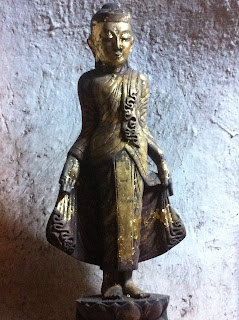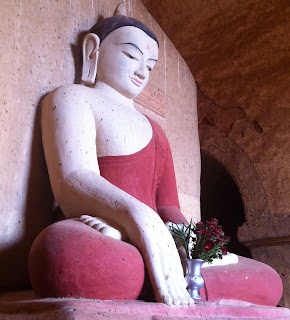Part IV - Buddhas & Stupas
“[…] The
great hall in which the Buddha, enormous, sits in his hierarchic attitude,
surrounded by others, eight or ten, hardly smaller, is like a barn, but its
roof is supported by huge columns of teak, gilt or lacquered, and the wooden
walls and rafters are gilt or lacquered too. Rude paintings of scenes in the
Master’s life hang from the eaves. It is dark and solemn, but the Buddhas sit
on their great lotus leaves in the gloaming like gods who have had their day,
and now neglected, but indifferent to neglect, in their decaying grandeur of
gilt and mosaic continue to reflect on suffering and the end of suffering,
transitoriness and the eightfold path. Their aloofness is almost terrifying.
You tread on tiptoe in order not to disturb their meditations and when you
close behind you the carved and gilded doors and come out once more into the
friendly day it is with a sigh of relief. You feel like a man who has gone by
accident to a party in the wrong house and on realising his mistake makes his
escape quickly and hopes that no one has noticed him.”
I do like
Maugham’s observations - they have a sharpness which is not bitter nor acrid but what I would call a sizzling bite! And I realise I have just used a dash,
which Maugham would certainly not approve of. “I have seldom read a sentence in
which it could not be well replaced by the elegant semi-colon or the discreet
bracket.”
In the following
passage Maugham meets up with an Italian
Catholic priest in a remote village on the way to Ken Tung, who hadn’t spoken
to a white man for eighteen months:
“ ‘I can do
nothing with the Shans,’ he told me. ‘They are Buddhists and they are satisfied
with Buddhism. It suits them.’ He gave me a deprecating look of his fine black
eyes and with a smile made a statement that I could see was so bold to his mind
that he was a trifle startled at it himself. ‘You know, one must admit that
Buddhism is a beautiful religion, I have long talks sometimes with the monk at
the Pongyi Chaun, he is not an uneducated man, and I cannot but respect him and
his faith.’
He soon
discovered that he could hope to influence only the people in the little lonely
villages in the jungle, for they were spirit-worshippers and their lives were
perplexed by the unceasing dread of the malignant powers that lay in wait to
ensnare them. But the villages are far away, in the mountains, and often he had
to go twenty, thirty or even forty miles to reach them."
“But the
other pagodas are deserted. Grass grows in the chinks of the pavement and young
trees have taken root in the crannies. They are the refuge of birds. Hawks
wheel about their summits and little green parrots chatter in the eaves. They
are like bizarre and monstrous flowers turned to stone. It is preposterous, so
that it makes you smile to look at it, but its exuberance is captivating. It is
quite unreal, shoddy but strange, and you are staggered at the fantasy that
could ever have devised it. It looks like the fabric of a single night made by
the swarming hands of one of those wayward gods of the Indian mythology. Within
the pagodas images of the Buddha sit in meditation. The gold leaf has long
since worn away from the colossal figures and the figures are crumbling to
dust. The fantastic lions that guard the entrance ways are rotting on their
pedestals.
A strange
and melancholy spot. I preferred to sit idly on the verandah of the circuit-house
and watch the scene before me. In the full tide of noon the sun burned all the
colour from the landscape so that the trees and the dwarf scrubs that grew
wildly, where in time past were the busy haunts of men, were pale and grey; but
with the declining day the colour crept back, like an emotion that tempers the
character and has been submerged for a while by the affairs of the world, and
trees and scrubs were again a sumptuous and living green. The sun set on the
other side of the river and a red cloud in the west was reflected on the
tranquil bosom of the Irrawaddy . There was not
a ripple on the water. The river seemed no longer to flow.”
And isn’t this the serene, halcyon tranquillity that we Westerners
ascribe to and identify with Eastern Buddhism, which Maugham here elevates to
an almost perfect syncretic sensory metaphor.
“Then a little novice came in with a platter on which were four or five
cakes of rice. He went down on his heels, a tiny little figure in yellow, with
large black eyes, and uttered a brief invocation and then left the platter
before the images. He had hardly gone before a pariah dog, evidently on the
watch, slipped in quickly, seized one of the cakes in his mouth and ran out
again. The early sun caught the gold on the Buddha and gave it a richness not
its own.”
Which makes me smile the Buddha smile.
Below a
series of pictures entitled Buddhas & Stupas. By clicking
the pictures below, they open up in a gallery.


















































































No comments:
Post a Comment